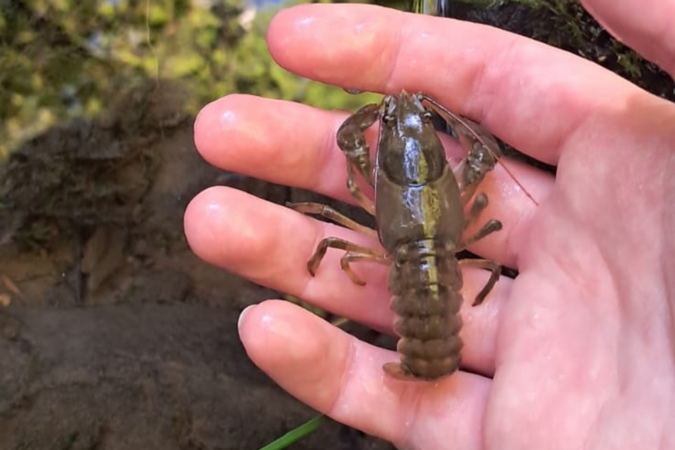White-clawed crayfish released into mid Wales ‘Ark Site’ to help save endangered species

The first of two groups of endangered white-clawed crayfish have been released into a carefully selected Ark Site in mid Wales as part of a Wales-wide conservation effort to save the species from extinction.
The release, led by Natural Resources Wales (NRW) with support from Severn Rivers Trust, Aberystwyth University and local partners, took place this week on the River Cledan. Juvenile crayfish reared for two years at NRW’s Cynrig Hatchery were introduced to the new site under strict biosecurity measures.
White-clawed crayfish are the UK’s only native freshwater crayfish and have been in steep decline for decades due to invasive non-native crayfish, crayfish plague, pollution and habitat loss. Since the 1970s, many populations in Wales have been lost.
Ark Sites are specially chosen safe havens where populations can be re-established and protected from threats. Rearing crayfish at the Cynrig Hatchery has increased survival rates to around 90% compared with less than 10% in the wild, and more than 7,000 young crayfish have already been produced for release.
Oli Brown, NRW Aquaculture Officer, said:
“This release is an important step in securing the future of white-clawed crayfish in Wales. By creating Ark Sites, we can give new populations the best possible chance to survive and thrive, safeguarding this species for generations to come.”
The Cledan release was supported by local landowner Sam Griffiths of Moel Ddolwen Farm, who joined with his three daughters to introduce some of the crayfish after school. Their involvement highlights the importance of passing on guardianship of nature to future generations.
Alongside the crayfish release, Natural Resources Wales and Severn Rivers Trust have been working with local farmers on both the River Cledan and the nearby River Gam through an annual NRW fund dedicated to restoring fisheries habitat in the Banwy catchment. This programme supports salmon and trout by fencing riverbanks to reduce livestock access, planting trees to cool river corridors and creating new fish habitat. Where access is excluded, solar-powered pumps provide alternative drinking water for stock. Together, these actions improve water quality, boost habitat and help create healthier rivers for fish, crayfish and other wildlife.
Dewi Morris, River Restoration Officer at Severn Rivers Trust, said:
“White-clawed crayfish are a vital part of healthy rivers, playing an important role in the freshwater food web. This project shows what can be achieved when communities, landowners and organisations work together. We are delighted to be part of this national effort to give the species a fighting chance.”
Severn Rivers Trust has also worked closely with Ysgol Cwm Banwy Primary School on river projects ranging from clean-ups to International Fish Migration Day. While the exact Ark Site location will remain confidential to protect the crayfish, the trust knows pupils and the local community will be proud to hear of the crayfish’s return.
Partners involved in the project include NRW, Severn Rivers Trust, Montgomeryshire Wildlife Trust, Aberystwyth University and the Canal & River Trust.
In 2021, a pivotal study funded by NRW and led by Montgomeryshire Wildlife Trust kickstarted a collaborative conservation initiative to conserve native, white-clawed crayfish in North Powys.
As part of the study, a working group was established with NRW, Montgomeryshire Wildlife Trust, Severn Rivers Trust, The Canal and River Trust, North Wales Wildlife Trust WAREN Project and Aberystwyth University to drive forward monitoring, research, and on-the-ground recovery actions. The release this week is the culmination of that work.
NRW leads the national Ark Sites programme and continues to work with partners to restore and monitor rivers across Wales.
Members of the public can support by following simple biosecurity steps such as Check, Clean, Dry when using rivers and streams, helping to stop the spread of invasive species and diseases.
If you spot a crayfish, you can record it by taking a photo and uploading the information to Home | iRecord.
Please take care to avoid disturbing white-clawed crayfish, as it is illegal to do so without a licence.
If you see dead crayfish, you can report this along with the location to the NRW incident communication line on 0300 065 3000 or by using the online report form Natural Resources Wales / Report an incident
